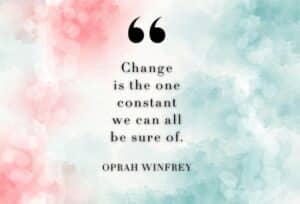
We left off last time by mentioning how the rules change. This is one of life’s little jokes. As soon as you get used to one condition or set of circumstances, it will probably be necessary, before too long, to readjust to something else. For humans, the primary survival trait is adaptability, and the young are better at it. This is one reason why, when correctly applied, being like a little child is a very desirable state.
Youth is when many people are easily able to swallow and assimilate anything without suffering a physical penalty. As the body ages, it becomes less tolerant and… the rules change. When something else is going on at the same time, this fact might be easy to ignore. In the case of Oprah Winfrey, trainer and friend Bob Greene pointed out that her thyroid issue was an easy excuse to fall back on, and that she had “absolutely” done so on more than one occasion.
People are usually pretty good at generating excuses for not achieving their dreams. Just like a regular human, the global influencer and star had a particular and individual issue to deal with. In her case, it was a medical condition that required expert management, as well as patient compliance.
At the same time, like billions of regular people, Oprah was getting older every minute. As time goes on, and even with dedicated effort, it becomes more and more difficult to stave off weight gain.
In human history, this has rarely been the case. For obesity to become a significant problem, a society has to reach the stage of having food surplus to its needs. The civilization advances to where it can afford to have some members unable to defend themselves, and dependent on others for their continued well-being. When the society has abundant food, and physical fitness is not a priority requirement, people can become obese.
The Bob Greene worldview
Greene theorized that no one, be they an anonymous teenager or a world-famous star, would ever be able to completely overcome food addiction; that the problem would never completely disappear, and would always need conscious and diligent management. He also suggested that no one could properly start the recovery journey without squarely facing five crucial questions:
What are you hungry for?
Why are you overweight?
Why have you been unable to maintain weight loss in the past?
What in your life is not working?
Why do you want to lose weight?
The last query is a particular challenge, because the seeker is quite likely to come up with the wrong answer. “Then I’ll be happy” is not the right one, because it encompasses only two possible outcomes, neither of which can satisfy, as Greene explains:
You never reach that size or weight and you’re never happy. And even worse, you reach that size and weight and realize it has nothing to do with your happiness.
The following year, 2010, was when Oprah famously stated for publication that she was not fond of the term “food addict,” but…
I realize that I really have been one. And believe me, I — like so many of you — have punished myself for that. But I know that I’m not alone, and I know that the battle hasn’t ended.
This admission seems to cover two bases: First, it pleads guilty to the same fat-hate that dwells in the heart of even the most compassionate person. Also, it appears to confirm that the last person anyone is ever able to forgive is their own self.
Your responses and feedback are welcome!
Source: “Oprah’s Weight Loss Confession,” Oprah.com, undated
Image by Oprah.com/Fair Use

 FAQs and Media Requests:
FAQs and Media Requests: 











